北师大版(2019)必修第一册 Unit 2 Sports and Fitness Lesson 1 The underdog period 课件(19张PPT)
文档属性
| 名称 | 北师大版(2019)必修第一册 Unit 2 Sports and Fitness Lesson 1 The underdog period 课件(19张PPT) | 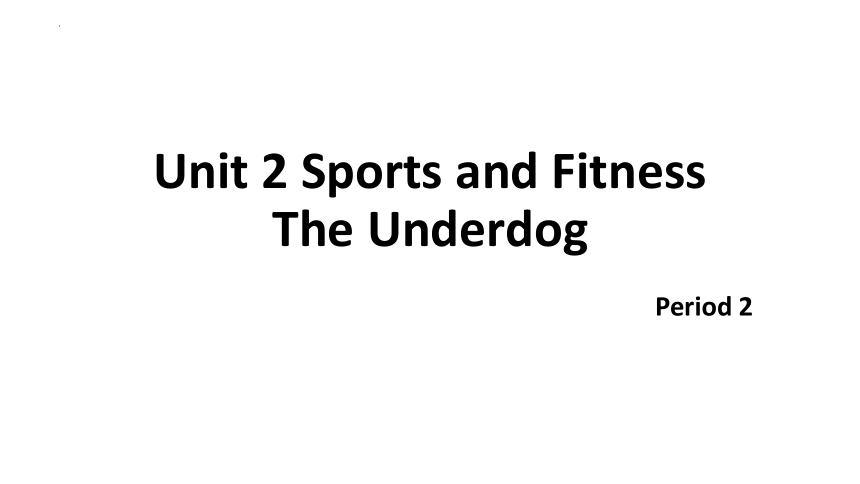 | |
| 格式 | pptx | ||
| 文件大小 | 7.2MB | ||
| 资源类型 | 教案 | ||
| 版本资源 | 北师大版(2019) | ||
| 科目 | 英语 | ||
| 更新时间 | 2023-09-22 10:48:05 | ||
图片预览

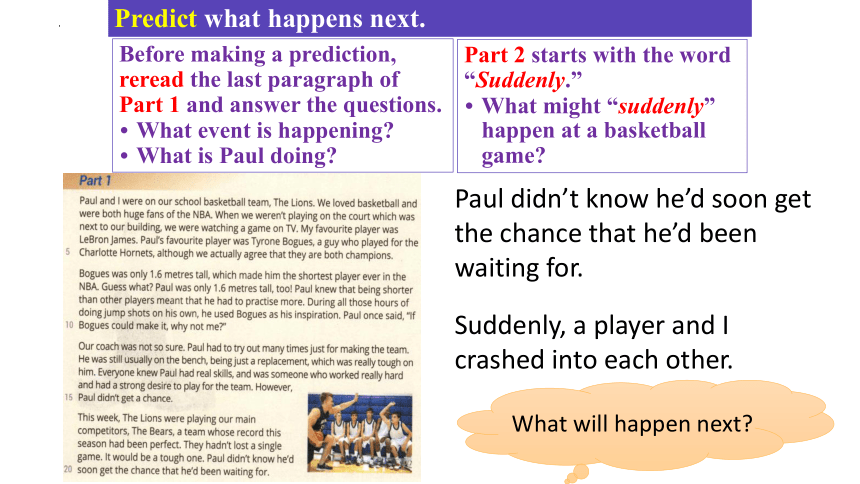
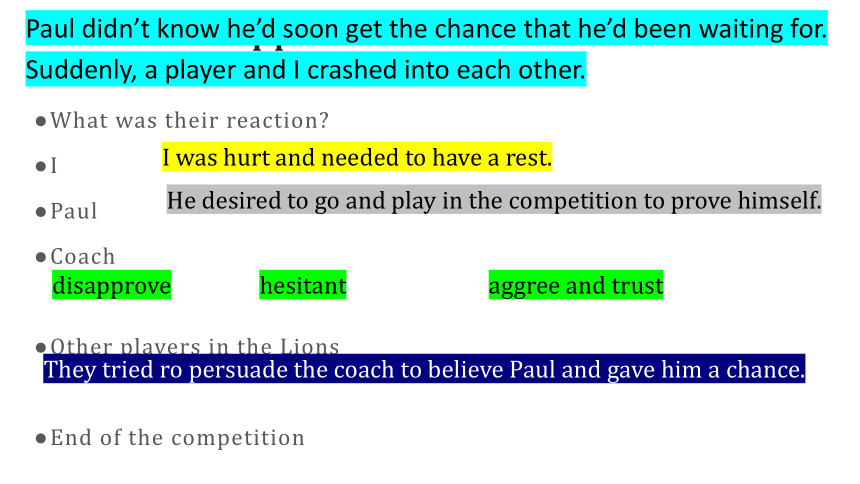
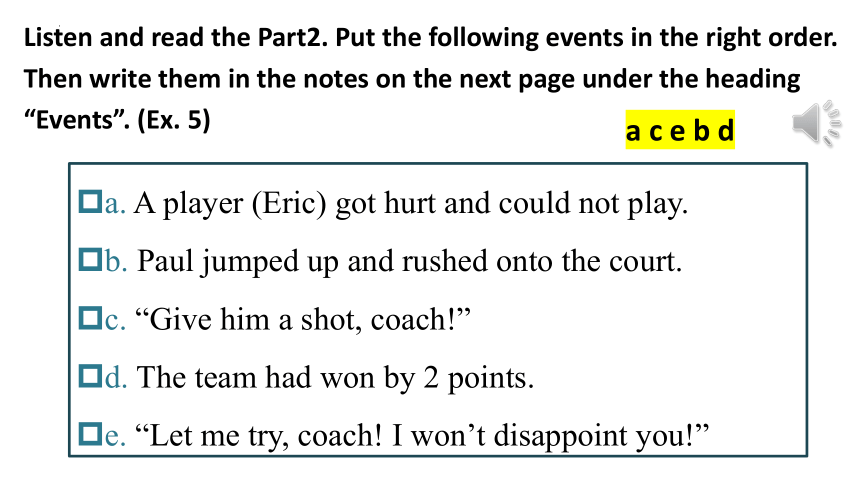
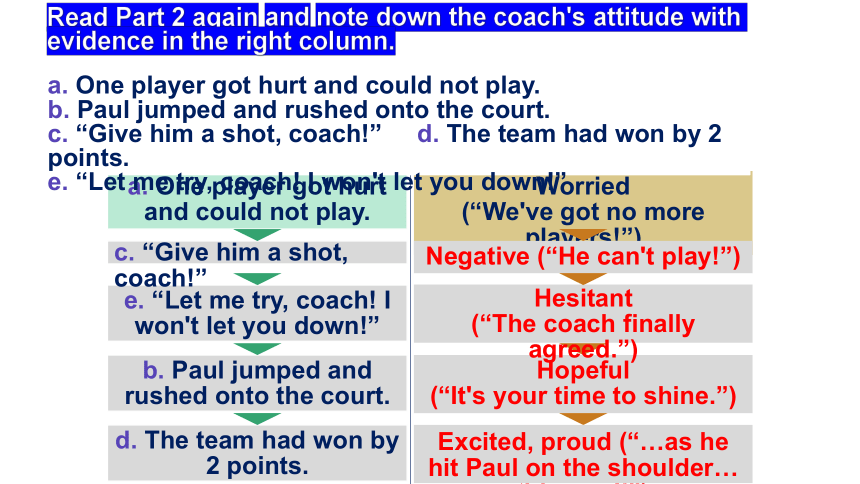

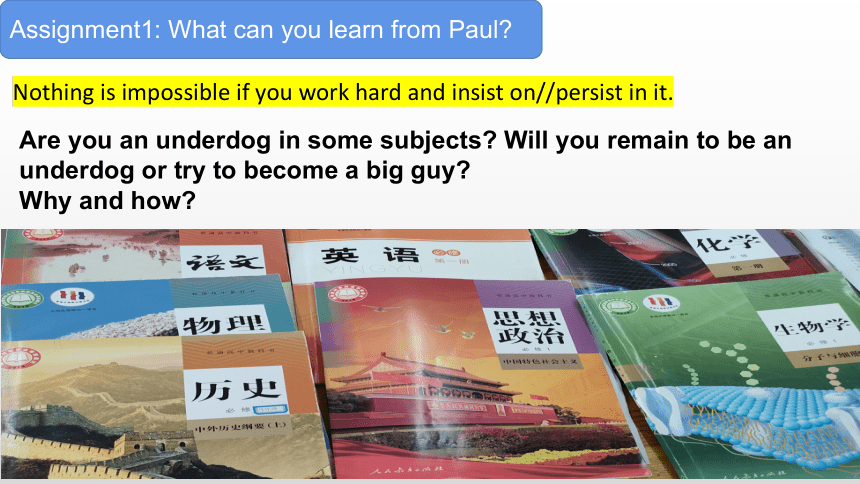
文档简介
(共19张PPT)
Unit 2 Sports and Fitness
The Underdog
Period 2
Predict what happens next.
Before making a prediction, reread the last paragraph of Part 1 and answer the questions.
What event is happening
What is Paul doing
Part 2 starts with the word “Suddenly.”
What might “suddenly”
happen at a basketball
game
Suddenly, a player and I crashed into each other.
What will happen next
Paul didn’t know he’d soon get the chance that he’d been waiting for.
What will happen next
What was their reaction
I
Paul
Coach
Other players in the Lions
End of the competition
Suddenly, a player and I crashed into each other.
Paul didn’t know he’d soon get the chance that he’d been waiting for.
disapprove
hesitant
aggree and trust
He desired to go and play in the competition to prove himself.
I was hurt and needed to have a rest.
They tried ro persuade the coach to believe Paul and gave him a chance.
Listen and read the Part2. Put the following events in the right order. Then write them in the notes on the next page under the heading “Events”. (Ex. 5)
a. A player (Eric) got hurt and could not play.
b. Paul jumped up and rushed onto the court.
c. “Give him a shot, coach!”
d. The team had won by 2 points.
e. “Let me try, coach! I won’t disappoint you!”
a c e b d
Read Part 2 again and note down the coach's attitude with evidence in the right column.
a. One player got hurt and could not play.
Events
The Coach‘s Attitude And Evidence
Worried
(“We've got no more players!”)
a. One player got hurt and could not play.
b. Paul jumped and rushed onto the court.
c. “Give him a shot, coach!” d. The team had won by 2 points.
e. “Let me try, coach! I won't let you down!”
c. “Give him a shot, coach!”
e. “Let me try, coach! I won't let you down!”
b. Paul jumped and rushed onto the court.
d. The team had won by 2 points.
Negative (“He can't play!”)
Hesitant
(“The coach finally agreed.”)
Hopeful
(“It's your time to shine.”)
Excited, proud (“…as he hit Paul on the shoulder… ‘big guy!’”)
1.What kind of player was Paul Find evidence from the story to support your view.
Possible Answer: I think Paul was a dedicated(专注的、投入的) player because he spent hours practicing even though he was never chosen by the coach.
2.Why did the coach call Paul “big guy”
What do you think the coach might have learnt from his experiences with Paul
Possible Answer: The coach learnt to be supportive of Paul when he was the one who saved the game and helped the team win. He may have learnt that he should never judge a person by his physical appearance but according to his ability.
Discuss these questions with your partner.
Assignment1: What can you learn from Paul
Are you an underdog in some subjects Will you remain to be an underdog or try to become a big guy
Why and how
Nothing is impossible if you work hard and insist on//persist in it.
Ⅱ 语法填空 (根据课文内容和语法规则完成短文)
Part 1
Paul and I were on our school basketball team,The Lions. We loved basketball and were both huge 1 (fan) of the NBA. My favorite player was LeBron James while Paul’s favourite player was Tyrone Bogues.
Paul was only 1. 6 metres tall,as tall as Bogues. Paul knew that 2 (be) shorter than other players meant that he had to practice 3 (much). Paul always used Bogues as his
4 (inspire).
Our coach was not so sure. Trying out many times just 5 making the team,Paul was still usually on the bench,being just 6 replacement,which was really tough on him. Everyone knew Paul had real skills,7 (work) really hard and had a strong desire 8 (play) for the team. However,Paul didn’t get a chance.
This week,The Lions were playing our main competitors,The Bears,a team 9 record this season had been perfect and who hadn’t lost a single game. Paul didn’t know he’d soon get himself 10 (recognize).
fans
being
more
inspiration
for
a
worked
to play
whose
recognised
Part 2
Suddenly,a player and I crashed 11 each other. My knee hurt badly. The team gathered around,looking 12 (worry). The last quarter was about 13 (begin),and my team was behind by 10 points. I told quietly to the coach that I couldn’t play anymore and we recommended(推荐) Paul. The coach refused 14 (sharp) at first but finally agreed.
Paul made a promise 15 he wouldn’t let the coach down.
Paul jumped up and rushed onto the court. And clearly,all the extra 16 (hour) that he
17 (spend)practicing alone paid off. The other team just couldn’t keep up with his energy and speed. He made shot after shot,and the crowd couldn’t stop 18 (clap) and cheering. When the game ended,our team had won by two points. The coach hit Paul on 19 shoulder and said that he’d earned 20 (he) place on the team.
into
worried
to begin
sharply
that
hours
had spent
clapping
his
the
C
Suddenly, a player and I crashed into each other.________________
__________________________________________________________
_____________________________
“Well,”said the coach as he hit Paul on the shoulder, “you’ve just earned your place on the team, big guy!”____________________
_____________________________
_____________________________
_____________________________
Assignment2:continuation writing(读后续写).
Focus on Language
——relative clauses
Can you recall any relative pronouns you have learnt about in the past
who whose which that
Study these sentences.
1. When we weren’t playing on the court which was next to our building, we were watching a game on TV.
2. Paul’s favourite player was Tyrone Bogues, a guy who played for the Charlotte Hornets.
3. The Bears, a team whose record this season had been perfect.
4. He didn’t know he’s soon get the chance that he’d been waiting for.
定语从句
关系代词
先行词
在复合句中,用作定语的从句叫定语从句。被定语从句修饰的名词或代词叫先行词。定语从句一般放在先行词的后面,由关系代词或关系副词引导。
引导定语从句的关系代词有:that, which, who, whom, whose等,关系副词有:where, when, why等。
作用:
①连接主句和从句;
②指代先行词;
③在从句中作句子成分。
定义
The girl who answered the phone was polite enough.
He is the man who / whom you have been looking for.
Read the sentence, find the relative clause and speak out its function.
(作主语,指人)
(作宾语,指人)
关系代词who和whom引导的定语从句,who和whom只可以指人,who在从句中可作主语或宾语,whom在从句中只作宾语。
These houses which face south have no trees around them.
The film which I saw last night is about a young teacher.
He was reading a book which he was very interested in.
(作主语,指物)
(作宾语,指物)
(作宾语,指物)
关系代词which引导的定语从句,which在从句中作主语
或宾语,只可以指物。
The boy that came here is Henry’s son.
The child that the woman looked after was suddenly missing.
The news that shocked all of us came from Mary.
The news that I heard came from Mary.
(作主语,指人)
(作宾语,指人)
(作主语,指物)
(作宾语,指物)
关系代词that引导的定语从句,that在从句中作主语或宾语,可以指人,也可以指物。
This is the famous doctor whose daughter teaches in our school.
Would you please pass me the book whose cover is blue
(指人)
(指物)
whose用来指代所属关系,在定语从句中作定语,起限定作用。whose引导定语从句时,先行词可以是人,也可以是物。
指代内容 所作成分 是否可省略
that
which
who
whom
whose
人;物
物
人
人
(人/物)的
主语,宾语
主语,宾语
主语,宾语
宾语
定语
作宾语可省
作宾语可省
作宾语可省
可省
不可省
Unit 2 Sports and Fitness
The Underdog
Period 2
Predict what happens next.
Before making a prediction, reread the last paragraph of Part 1 and answer the questions.
What event is happening
What is Paul doing
Part 2 starts with the word “Suddenly.”
What might “suddenly”
happen at a basketball
game
Suddenly, a player and I crashed into each other.
What will happen next
Paul didn’t know he’d soon get the chance that he’d been waiting for.
What will happen next
What was their reaction
I
Paul
Coach
Other players in the Lions
End of the competition
Suddenly, a player and I crashed into each other.
Paul didn’t know he’d soon get the chance that he’d been waiting for.
disapprove
hesitant
aggree and trust
He desired to go and play in the competition to prove himself.
I was hurt and needed to have a rest.
They tried ro persuade the coach to believe Paul and gave him a chance.
Listen and read the Part2. Put the following events in the right order. Then write them in the notes on the next page under the heading “Events”. (Ex. 5)
a. A player (Eric) got hurt and could not play.
b. Paul jumped up and rushed onto the court.
c. “Give him a shot, coach!”
d. The team had won by 2 points.
e. “Let me try, coach! I won’t disappoint you!”
a c e b d
Read Part 2 again and note down the coach's attitude with evidence in the right column.
a. One player got hurt and could not play.
Events
The Coach‘s Attitude And Evidence
Worried
(“We've got no more players!”)
a. One player got hurt and could not play.
b. Paul jumped and rushed onto the court.
c. “Give him a shot, coach!” d. The team had won by 2 points.
e. “Let me try, coach! I won't let you down!”
c. “Give him a shot, coach!”
e. “Let me try, coach! I won't let you down!”
b. Paul jumped and rushed onto the court.
d. The team had won by 2 points.
Negative (“He can't play!”)
Hesitant
(“The coach finally agreed.”)
Hopeful
(“It's your time to shine.”)
Excited, proud (“…as he hit Paul on the shoulder… ‘big guy!’”)
1.What kind of player was Paul Find evidence from the story to support your view.
Possible Answer: I think Paul was a dedicated(专注的、投入的) player because he spent hours practicing even though he was never chosen by the coach.
2.Why did the coach call Paul “big guy”
What do you think the coach might have learnt from his experiences with Paul
Possible Answer: The coach learnt to be supportive of Paul when he was the one who saved the game and helped the team win. He may have learnt that he should never judge a person by his physical appearance but according to his ability.
Discuss these questions with your partner.
Assignment1: What can you learn from Paul
Are you an underdog in some subjects Will you remain to be an underdog or try to become a big guy
Why and how
Nothing is impossible if you work hard and insist on//persist in it.
Ⅱ 语法填空 (根据课文内容和语法规则完成短文)
Part 1
Paul and I were on our school basketball team,The Lions. We loved basketball and were both huge 1 (fan) of the NBA. My favorite player was LeBron James while Paul’s favourite player was Tyrone Bogues.
Paul was only 1. 6 metres tall,as tall as Bogues. Paul knew that 2 (be) shorter than other players meant that he had to practice 3 (much). Paul always used Bogues as his
4 (inspire).
Our coach was not so sure. Trying out many times just 5 making the team,Paul was still usually on the bench,being just 6 replacement,which was really tough on him. Everyone knew Paul had real skills,7 (work) really hard and had a strong desire 8 (play) for the team. However,Paul didn’t get a chance.
This week,The Lions were playing our main competitors,The Bears,a team 9 record this season had been perfect and who hadn’t lost a single game. Paul didn’t know he’d soon get himself 10 (recognize).
fans
being
more
inspiration
for
a
worked
to play
whose
recognised
Part 2
Suddenly,a player and I crashed 11 each other. My knee hurt badly. The team gathered around,looking 12 (worry). The last quarter was about 13 (begin),and my team was behind by 10 points. I told quietly to the coach that I couldn’t play anymore and we recommended(推荐) Paul. The coach refused 14 (sharp) at first but finally agreed.
Paul made a promise 15 he wouldn’t let the coach down.
Paul jumped up and rushed onto the court. And clearly,all the extra 16 (hour) that he
17 (spend)practicing alone paid off. The other team just couldn’t keep up with his energy and speed. He made shot after shot,and the crowd couldn’t stop 18 (clap) and cheering. When the game ended,our team had won by two points. The coach hit Paul on 19 shoulder and said that he’d earned 20 (he) place on the team.
into
worried
to begin
sharply
that
hours
had spent
clapping
his
the
C
Suddenly, a player and I crashed into each other.________________
__________________________________________________________
_____________________________
“Well,”said the coach as he hit Paul on the shoulder, “you’ve just earned your place on the team, big guy!”____________________
_____________________________
_____________________________
_____________________________
Assignment2:continuation writing(读后续写).
Focus on Language
——relative clauses
Can you recall any relative pronouns you have learnt about in the past
who whose which that
Study these sentences.
1. When we weren’t playing on the court which was next to our building, we were watching a game on TV.
2. Paul’s favourite player was Tyrone Bogues, a guy who played for the Charlotte Hornets.
3. The Bears, a team whose record this season had been perfect.
4. He didn’t know he’s soon get the chance that he’d been waiting for.
定语从句
关系代词
先行词
在复合句中,用作定语的从句叫定语从句。被定语从句修饰的名词或代词叫先行词。定语从句一般放在先行词的后面,由关系代词或关系副词引导。
引导定语从句的关系代词有:that, which, who, whom, whose等,关系副词有:where, when, why等。
作用:
①连接主句和从句;
②指代先行词;
③在从句中作句子成分。
定义
The girl who answered the phone was polite enough.
He is the man who / whom you have been looking for.
Read the sentence, find the relative clause and speak out its function.
(作主语,指人)
(作宾语,指人)
关系代词who和whom引导的定语从句,who和whom只可以指人,who在从句中可作主语或宾语,whom在从句中只作宾语。
These houses which face south have no trees around them.
The film which I saw last night is about a young teacher.
He was reading a book which he was very interested in.
(作主语,指物)
(作宾语,指物)
(作宾语,指物)
关系代词which引导的定语从句,which在从句中作主语
或宾语,只可以指物。
The boy that came here is Henry’s son.
The child that the woman looked after was suddenly missing.
The news that shocked all of us came from Mary.
The news that I heard came from Mary.
(作主语,指人)
(作宾语,指人)
(作主语,指物)
(作宾语,指物)
关系代词that引导的定语从句,that在从句中作主语或宾语,可以指人,也可以指物。
This is the famous doctor whose daughter teaches in our school.
Would you please pass me the book whose cover is blue
(指人)
(指物)
whose用来指代所属关系,在定语从句中作定语,起限定作用。whose引导定语从句时,先行词可以是人,也可以是物。
指代内容 所作成分 是否可省略
that
which
who
whom
whose
人;物
物
人
人
(人/物)的
主语,宾语
主语,宾语
主语,宾语
宾语
定语
作宾语可省
作宾语可省
作宾语可省
可省
不可省
同课章节目录
- Unit 1 Life Choices
- Lesson 1 Lifestyles
- Lesson 2 Understanding and Coping with Stress
- Lesson 3 Your Life Is What You Make It
- Unit 2 Sports and Fitness
- Lesson 1 The Underdog
- Lesson 2 Rules of the Game
- Lesson 3 Running and Fitness
- Unit 3 Celebrations
- Lesson 1 Spring Festival
- Lesson 2 Special Occasions
- Lesson 3 Memories of Christmas
